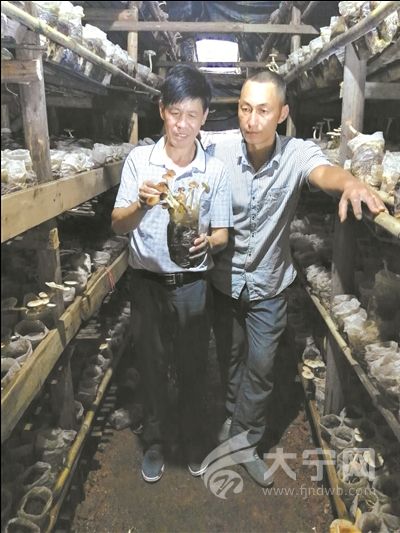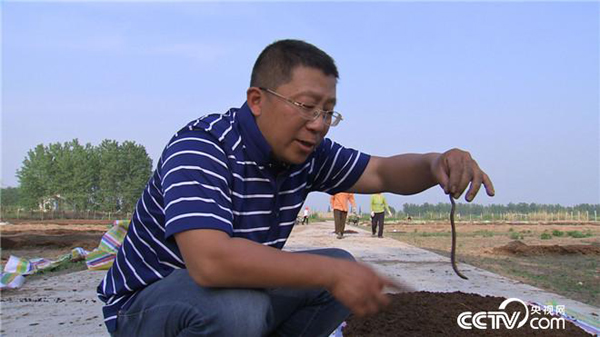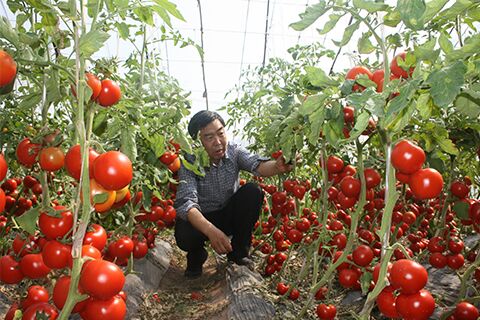Ruan Yi, Director of Kexing Edible Fungi Research Institute in Gutian County

Ruan Yi (first from left) is guiding the management of mushroom production by mushroom farmers in summer.
Ruan Yi, male, Han nationality, was born in December 1958 and joined the Party in October 1984. The former student who failed in the college entrance examination became an expert on edible fungi with his hard work and unremitting efforts. In 1995, he founded Gutian County Kexing Edible Fungi Research Institute, trying to popularize his research results and lead the villagers and elders to become rich together.
Engaged in edible mushroom production and research for more than 30 years, he has undertaken more than 20 provincial, municipal and county edible mushroom research projects and published more than 20 papers in various relevant journals throughout the country. Every time after selling the bacteria, he would go to the mushroom farmers' homes to collect and solve the practical problems in the process of edible mushroom cultivation, and provide financial and technical help to some mushroom farmers with financial difficulties, and make due contributions to the sustainable development of the edible mushroom industry and the increase of farmers' income in Gutian County.
A few days ago, Ruan Yi, director of the Kexing Edible Fungi Research Institute in Gutian County, came to the home of mushroom farmers in Pinghu Town to promote new varieties of tea mushrooms, and to collect and solve practical problems in the process of edible mushroom cultivation. As long as the mention of this native "folk edible fungus expert", the local people all give a thumbs up. He has devoted himself to the production and research of edible fungi for more than 30 years. He has won more than ten honorary titles, such as "National Rural Science and Technology Leader", "National Agricultural Technology Popularization contribution Award", "National Rural Science Popularization Leader", "Rural practical Outstanding talents in Fujian Province" and so on. Behind the glamorous honor, all embody his persistent pursuit of science and his extraordinary contribution to the edible mushroom industry.
Today, Gutian County, known as the "capital of edible fungi in China", about 70% of the labor force is engaged in the production, supply and marketing of edible fungi, and the edible mushroom industry has become an important pillar industry in the area. However, in the 1980s, the cultivation of edible fungi was still a high-risk industry. Due to the immature technology and the original extensive production and sales, many mushroom farmers lost all their money, and people did not dare to try it easily. Ruan Yi, who failed in the college entrance examination and worked at home, saw that his elders in his hometown were living in poverty and living in poverty because of the traffic blockage. So while he went to the fields to do farm work, he carefully observed the rich industry and found that growing mushrooms was a promising industry.
"I started from a mushroom shed of less than 1 mu. I borrowed 300 yuan from my family without funds. I earned 500 yuan in a bumper mushroom harvest that year." Ruan Yi recalled the beginning of his business with a bit of nostalgia. After tasting the sweetness of growing edible fungi, he was even more energetic and began to learn all kinds of edible mushroom cultivation knowledge by himself, while consulting teachers everywhere to explore the mysteries of the edible mushroom world. With the continuous improvement of the technical level of production and management, the production of edible fungi has advanced by leaps and bounds, and Ruan Yi has finally blazed a path of development. At the same time, he also unreservedly passed on the technology to the young people in the village and founded the Gutian County Kexing Edible Mushroom Research Institute in 1995, trying to popularize his research results and lead the villagers and elders to become rich together.
Tea mushroom was successfully introduced from Jiangxi Province in 1997 as a new member of the edible mushroom family. Because of its high nutrition and good taste, it is very popular in the market. However, because it is a new variety, some technologies are not yet fully mature, mushroom farmers have appeared the phenomenon of 40% raw material barrel pollution in the planting process, affecting the efficiency of production. "the needs of mushroom farmers are my responsibility." Although the Kexing Edible Fungi Research Institute is only a private scientific research institution, Ruan Yi took the blame on himself. He locked himself up in the laboratory and experimented repeatedly every day, and he lost several pounds in just a few months.
Opportunities are always favored by people with a heart. Near the Spring Festival, Ruan Yi came home and saw everyone adding tea tree ash water to the raw materials when making white rice. "isn't tea ash alkaline? And isn't the strain of Pleurotus ostreatus also extracted from tea trees? " Everything suddenly became clear, and regardless of the approach of the New year, he immediately ran back to the laboratory to re-test the culture medium of tea mushroom. After breaking through the key point, Ruan Yi finally selected and bred the tea tree mushroom variety "Gucha No.2" after a long time of repeated experiments. This variety has the advantages of early mushroom emergence, fast tide change, strong stress resistance and high yield. it has been rapidly popularized and cultivated throughout the county, making tea tree mushroom a new fungus planted by mushroom farmers in Gutian county.
A single branch is not spring, a hundred flowers blossom and spring fills the garden. He also insisted on spreading what he had learned to every inch of land in Gutian, in the hands of every mushroom farmer. To this end, Ruan Yi led the staff of the institute to travel in all directions, compiling technical materials, carrying out technical training, establishing a demonstration base, and going deep into the Tian Tou mushroom shed to solve technical problems for mushroom farmers. Over the years, he has traveled all over the mushroom sheds of Gutian.
"where there are difficulties, there is his figure." Li Rengui, a mushroom farmer in Jizhao Village, Chengxi Street, whose family moved from other places, saw the rapid development of Gutian edible mushroom industry and borrowed money to plant 60,000 tubes of tea tree mushrooms. However, due to the lack of technical elements, the mushroom tube was seriously polluted, and Li Rengui was so anxious that he could not sleep every night. After being recommended to find Ruan Yi, he went to the mushroom shed without saying a word and plunged into the analysis and research, and carried out technical guidance according to the cause of the disease. And provide "Gucha No. 2" tea tree mushroom strain free of charge. With his help, Li Rengui earned more than 100,000 yuan that year, which not only paid off his debts, but also had a slight surplus, which made him devote himself more enthusiastically to the production of edible fungi.
Ruan Yi is not only a "considerate person" in the hearts of Gutian mushroom farmers, but also an "enthusiastic expert" in the eyes of edible mushroom practitioners outside the province and even abroad. Over the years, the Kexing Research Institute under his leadership has provided more than 30,000 people of technical training and technical advice to mushroom farmers all over the country, and given away more than 30,000 copies of technical materials free of charge. for the majority of mushroom farmers to solve a large number of technical problems encountered in the production of tea tree mushrooms, flower mushrooms, apricot abalone mushrooms and so on. In 2000, Kexing Edible Fungi Research Institute was listed as an international edible mushroom technical training practice base by the United Nations "South-South Cooperation" Organization. It successively taught 430 foreign students from 73 countries, and was well received by foreign students and leaders of provincial and municipal science and technology departments.
Related
- A course of planting techniques and methods on how to grow carrots
- How to plant the latest tulips?
- Is it better to pick tea in the morning or in the afternoon? When is the best time for tea to be picked? what is the third or fifth tea?
- Launch Yuanxiao Happy combination Haocha + Tea Yuan healthy Taste
- Penghu Tourism "Fireworks 20 Parade with You"
- 2022 West Lake Happiness holds "Digital Revitalization Voucher" and draws iphone13 and laptop.
- Banqiao Fuzhou social houses are designed to change start-up combined with police elimination to create a safe and livable environment
- The convenient measure of "mechanical weeding" in Xinbei has been abused and the Agriculture Bureau has imposed heavy penalties on the illegal land consolidation.
- Changgeng University Joins Hands with Four Memory Factories to Rescue Memory Talent Shortage
- The list of Taiwan's top 100 MVP managers is listed by the Director-General of the Farmers' Association of Sanxia District.



